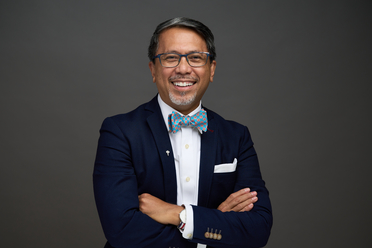
Fidelindo Lim
DNP CCRN FAAN
Clinical Associate Professor
Program Director, Nursing Education
fl9@nyu.edu
1 212 992 9078
433 First Ave
New York, NY 10010
United States
Fidelindo Lim's additional information
-
-
Fidelindo Lim, DNP, RN, FAAN, is a Clinical Associate Professor at NYU Rory Meyers College of Nursing. His teaching and scholarly interests include nursing education, LGBTQ+ health, reflective practice, men in nursing, and the nursing humanities. He is widely recognized for his work integrating inclusive health content into nursing curricula. Prof. Lim currently serves as a member of the American Nurses Association’s (ANA) Center for Ethics and Human Rights Advisory Board and was appointed to the ANA’s Code of Ethics for Nurses 2025 Re’Vision National Expert Panel. He also contributes monthly to the ANA’s American Nurse Journal as a designated “Nurse Influencer.”
Lim led a national study examining faculty readiness to teach LGBTQ+ health content in prelicensure nursing programs, a first-of-its-kind investigation cited in numerous white papers and national policy statements. His scholarship has advanced faculty development in inclusive education and informed best practices in curriculum design across the country.
Prior to joining the faculty at NYU Meyers, Lim worked as a critical care nurse for 18 years while concurrently serving as a nursing educator since 1996. He has authored more than 250 publications on a range of topics, including active learning, nursing pedagogy, clinical practice, preceptorship, Florence Nightingale’s legacy, and student engagement. He has served as a long-standing faculty advisor to various student groups and has curated impactful extracurricular programming to enrich nursing education for three decades.
Among his many honors, Lim was named a Fellow of the American Academy of Nursing. In 2021, he was featured in the ANA-sponsored documentary American Nurse Heroes, a nationally televised tribute to frontline nurses during the Year of the Nurse. He is also a board member of the NYU Meyers Alumni Association.
-
-
DNP, Northeastern UniversityMA, New York UniversityBSN, Far Eastern University, Manila, Philippines
-
-
Acute CareCritical careLGBTQNursing education
-
-
American Nurses Association New YorkAmerican Association of Critical Care NursesAmerican Association for Men in NursingHonor Society of Nursing, Sigma Theta Tau InternationalPhilippine Nurses Association of New YorkAmerican Association of Critical Care Nurses' Diversity, Equity, and Inclusion Leadership NetworkNational League for Nursing
-
-
Faculty Honors Awards
Distinguished Teaching Award - New York University Meyers College of Nursing (2025)Mentorship Award - American Nurse Association New York (2024)Expert Panelist - American Nurses Association’s (ANA) Code of Ethics for Nurses 2025 Re’Vision (2023)Faculty Trailblazer - New York University (2023)Inducted as a Fellow - American Academy of Nursing (AAN) (2022)Nurse Faculty Scholars Mentored Writing Award - American Journal of Nursing (2022)Fellow - New York University Aging Incubator (2021)Nursing Education Award - American Nurses Association New York (2021)Nurse Influencer - American Nurses Association (2020)DAISY Foundation Award for Extraordinary Nursing Faculty – NYU Meyers (2020)National League of Nursing (NLN) Innovation Center, Honorable Mention for article "Nursing Humanities: Teaching for a Sense of Salience" (2019)Fellow - New York Academy of Medicine (2019)Member of the Year - American Association for Men in Nursing (2018)Rose and George Doval Teaching Award - NYU Rory Meyers College of Nursing (2017)Distinguished Clinical Nursing Faculty Award - NYU, College of Nursing - Undergraduate Nursing Students Association (2015)Baccalaureate Faculty Excellence Award - NYU, College of Nursing Students Association (2014)Nursing Education Foundation Scholarship Award - National League for Nursing (2013)Nurse Educator of the Year, Philippine Nurses Association of New York, Inc. (2013) -
-
Publications
New Grad Transition to Practice: What Faculty Need to Know and Do. National Student Nurses Association Faculty Forum. Presenter. January 24, 2022
AbstractLim, F. (2022).Abstract~Professional Identity in the Health Disciplines. National Student Nurses Association Faculty Forum. Panelist. November 28, 2022
AbstractLim, F. (2022).Abstract~Summertime… and the patient is uneasy?
AbstractLim, F. (2022). In American Nurse.AbstractThe article explore the July Effect phenomenon and how it relates to nursing.Test Item Writing Workshop for Master's in Nursing Education Students. New York University Meyers College of Nursing. Presenter. July 28, 2022
AbstractLim, F. (2022).Abstract~ -
-
Media